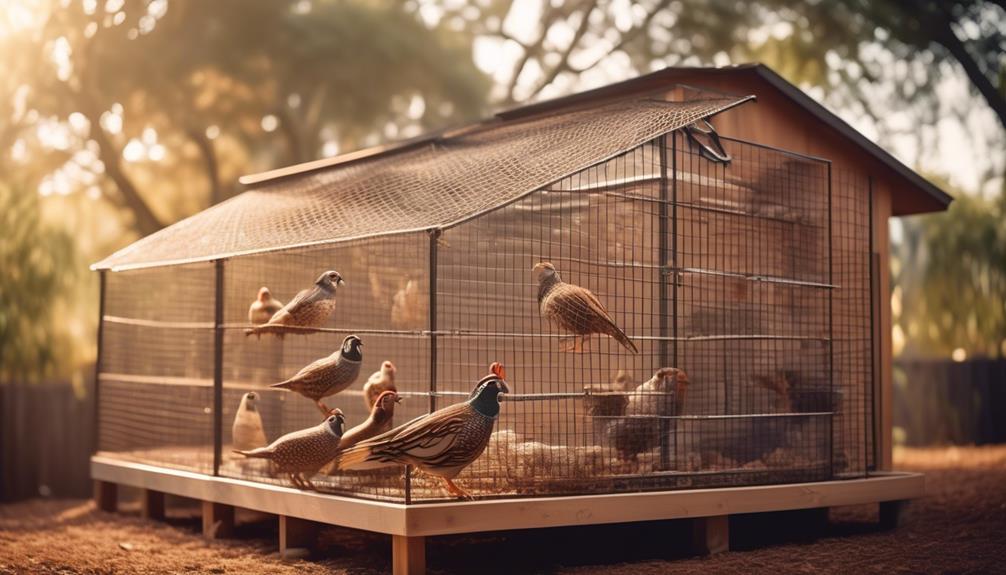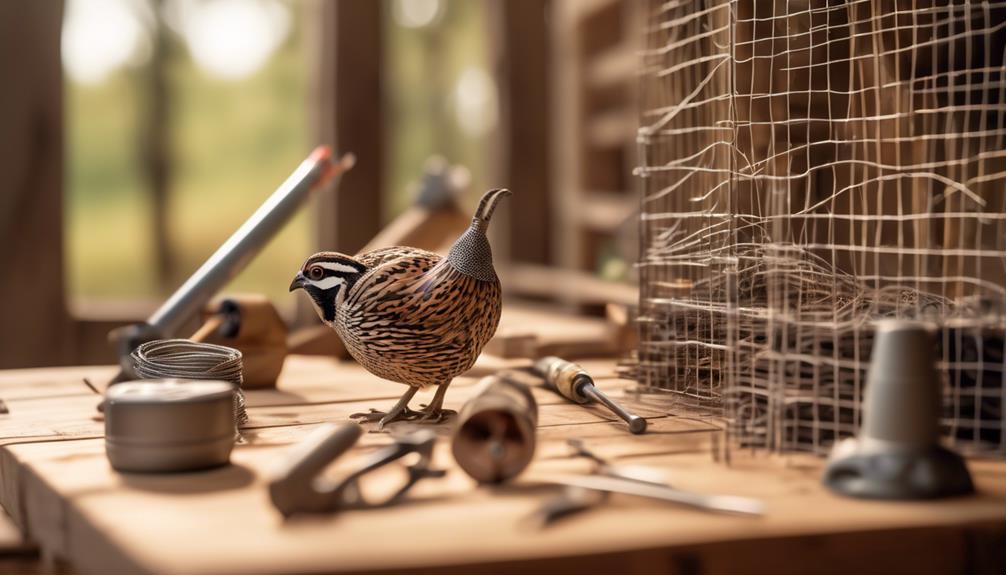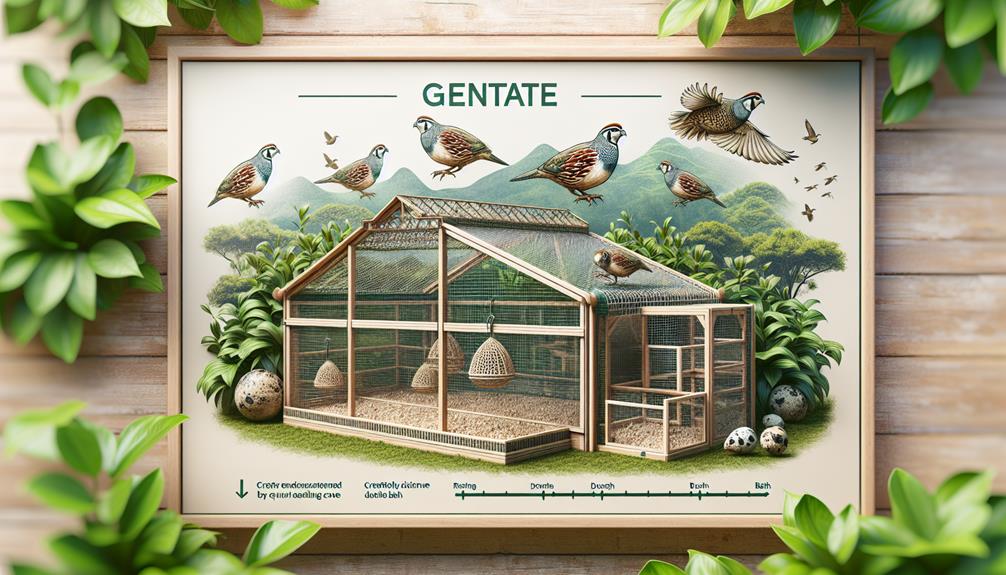Did you know that the global quail population has been steadily declining over the past few decades? It's a concerning statistic that highlights the need for us to take action and create safe habitats for these charming birds.
But fear not, because in this article, we will unveil the power of quail coops and show you how to build the perfect habitat for your quails. From discussing the importance of coops to exploring different design ideas, we will guide you every step of the way.
So, if you're ready to provide your quails with a secure and thriving environment, keep reading to discover the secrets of building the ultimate quail coop.
Key Takeaways
- Quail coops are essential for providing a safe and protected habitat for quails, as they are vulnerable to predators.
- Coops offer unlimited access to food, water, and dust baths, ensuring the quails' well-being.
- Proper ventilation and easy access for cleaning and maintenance are crucial for maintaining a healthy coop environment.
- There are various quail coop designs available, such as stacked, wire, ground, tractor, and hutch coops, catering to different needs and preferences.
Importance of Quail Coops
Quail coops play a vital role in ensuring the safety and well-being of these small, defenseless birds against potential predators and provide them with essential resources for a thriving life.
Raising quails in a coop offers numerous benefits compared to free range. Firstly, coops provide a protected habitat that shields quails from predators like snakes, raccoons, foxes, and coyotes. Without a coop, these vulnerable birds lack defense mechanisms, making them easy targets.
Secondly, coops offer unlimited access to food, water, and dust baths for grooming, ensuring that quails receive proper nutrition and care. Coops also reduce the risk of parasites and diseases, providing a healthy environment for quails to thrive.
Key Features to Consider
When designing a quail coop, there are several key features to consider for creating a safe and thriving environment for your birds.
- Proper ventilation is crucial for the health of your quails. It helps to minimize odors and prevent the buildup of harmful gases. Good airflow also ensures fresh air and helps regulate temperature and humidity levels inside the coop.
- Maintaining cleanliness in your quail coop is essential. Regularly removing droppings and replacing bedding will help prevent the spread of diseases and parasites. It's also important to provide easy access for cleaning and maintenance, such as removable trays or sliding doors.
- Adequate space is necessary for your quails to move around comfortably. Crowded conditions can lead to stress, aggression, and health issues. Aim for at least 1 square foot of space per quail.
- Ensure that your coop design meets the basic needs of your quails. This includes providing areas for nesting, perching, dust bathing, and access to food and water.
- Consider incorporating innovative features such as automated feeding and watering systems, solar-powered ventilation, and predator-proofing measures to enhance the functionality and safety of your quail coop.
Different Quail Coop Designs

To explore the various options for quail coop designs, let's now focus on different innovative and practical ideas that can meet the needs of your quails while ensuring their safety and well-being.
Raising quails in coops offers several benefits compared to free-range quail farming. Coops provide a protected habitat that shields quails from predators like snakes, raccoons, foxes, and coyotes. They offer unlimited access to food, water, and dust baths for grooming, promoting a happy and healthy life for the birds. Coops also reduce the risk of parasites and diseases, ensuring better overall health for your quails.
When it comes to different coop designs, options like stacked coops, wire coops, ground coops, tractor coops, and hutch coops offer versatility and functionality. Each design has its unique features, catering to different space requirements, mobility needs, and accessibility for people of all ages.
With these innovative designs, you can create a perfect habitat for your quails while maximizing their safety and well-being.
Step-by-Step Guide to Building
Start by gathering all the necessary materials and tools for building your quail coop. Here's a step-by-step guide to help you create the perfect habitat for your quails:
- Determine the type of coop you want and adjust the size based on the number of quails.
- Gather materials such as wood, wood screws, hardware cloth, wire snips, staple gun, and roofing material.
- Start by building the top frame of the coop using corner posts and 2x4s.
- Construct the walls and add a door for easy access.
- Install the roof and make any necessary adjustments or additions.
When building your quail coop, it's important to avoid common mistakes like not providing enough space or ventilation. Make sure to design the coop in a way that facilitates easy cleaning and maintenance. Regularly check for any signs of wear and tear and perform necessary repairs.
Materials Needed for Construction

You will need a variety of materials to construct a quail coop that provides a safe and comfortable environment for your quails to thrive. Here is a table outlining the materials needed, along with some cost considerations and maintenance tips:
| Materials | Cost Considerations | Maintenance Tips |
|---|---|---|
| Wood | Consider using reclaimed or recycled wood to save costs. | Regularly check for signs of wear and rot, and treat the wood to prevent damage from weather and pests. |
| Wood screws | Opt for rust-resistant screws for durability. | Tighten any loose screws periodically to keep the coop sturdy. |
| ¼-inch hardware cloth | Choose a high-quality material to prevent predator intrusion. | Inspect the hardware cloth regularly for any signs of damage and repair or replace as needed. |
| Wire snips | Invest in a good quality pair for ease of use. | Clean and oil the snips after each use to maintain their performance. |
| Heavy-duty staple gun | Consider renting or borrowing if you don't already have one. | Clean and lubricate the staple gun regularly to prevent jamming. |
| Roofing material | Choose a durable and weather-resistant option. | Inspect the roof regularly for any leaks or damage, and repair or replace as necessary. |
Frequently Asked Questions
What Is the Average Lifespan of a Quail?
The average lifespan of a quail is around 2-3 years. To maximize their lifespan, focus on proper quail breeding techniques, providing a safe and comfortable habitat, and ensuring access to a nutritious diet and clean water.
What Are the Different Types of Quail Breeds Suitable for Coops?
When it comes to quail coop designs, there are various options to consider. Breeding techniques, such as stacked, wire, ground, tractor, and hutch coops, offer innovative ways to create a perfect habitat for your quails.
How Can I Protect My Quails From Predators if I Don't Have a Coop?
To protect your quails without a coop, consider alternative housing options like predator-proof pens or aviaries. These structures can provide safety, space, and protection from predators while still allowing your quails to roam and forage.
Can Quails Be Kept Indoors or Do They Need Outdoor Space?
Quails can be kept indoors or outdoors, but each option has pros and cons. Indoor quail habitats provide better predator protection and temperature control, but outdoor space allows for natural foraging and behavioral enrichment.
Are There Any Specific Maintenance Tasks Required for Quail Coops?
To keep your quail coop in top shape, there are specific maintenance tasks you'll need to tackle. Regular cleaning, including removing waste and refreshing bedding, should be part of your schedule.
Conclusion
In conclusion, by building a quail coop, you aren't only providing a safe and thriving habitat for your feathered friends, but you're also unleashing the power of protection, health, and convenience.
The coop symbolizes your dedication and care for your quails, ensuring their well-being and happiness.
So, gather the materials, follow the step-by-step guide, and create the perfect habitat that won't only benefit your quails but also bring you joy and fulfillment as a quail enthusiast.

